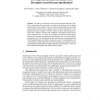Free Online Productivity Tools
i2Speak
i2Symbol
i2OCR
iTex2Img
iWeb2Print
iWeb2Shot
i2Type
iPdf2Split
iPdf2Merge
i2Bopomofo
i2Arabic
i2Style
i2Image
i2PDF
iLatex2Rtf
Sci2ools
HIPEAC
2009
Springer
2009
Springer
Deriving Efficient Data Movement from Decoupled Access/Execute Specifications
Abstract. On multi-core architectures with software-managed memories, effectively orchestrating data movement is essential to performance, but is tedious and error-prone. In this paper we show that when the programmer can explicitly specify both the memory access pattern and the execution schedule of a computation kernel, the compiler or run-time system can derive efficient data movement, even if analysis of kernel code is difficult or impossible. We have developed a framework of C++ classes for decoupled Access/Execute specifications, allowing for automatic communication optimisations such as software pipelining and data reuse. We demonstrate the ease and efficiency of programming the Cell Broadband Engine architecture using these classes by implementing a set of benchmarks, which exhibit data reuse and non-affine access functions, and by comparing these implementations against alternative implementations, which use hand-written DMA transfers and software-based caching.
| Added | 16 Aug 2010 |
| Updated | 16 Aug 2010 |
| Type | Conference |
| Year | 2009 |
| Where | HIPEAC |
| Authors | Lee W. Howes, Anton Lokhmotov, Alastair F. Donaldson, Paul H. J. Kelly |
Comments (0)

